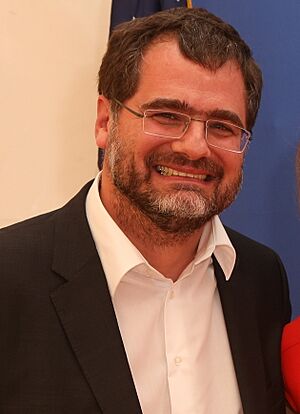Federal Minister for Special Affairs of Germany facts for kids
Quick facts for kids GermanyFederal Minister for Special Affairs |
|
|---|---|
 |
|
| German Chancellery | |
| Formation | 6 October 1953 |
| First holder | Franz Josef Strauß |
A Federal Minister for Special Affairs (in German: Bundesminister für besondere Aufgaben) is a special member of the German government. This person is a minister without portfolio. This means they are a minister but do not lead a specific government department, like the Ministry of Finance or Education. Instead, they handle tasks given to them directly by the Chancellor.
Contents
What Does a Minister for Special Affairs Do?
Early Ministers for Special Affairs were given many different jobs by the Chancellor. For example, Robert Tillmanns, one of the first ministers, helped the government work with the Bundestag, which is Germany's parliament. Other ministers handled things like helping small businesses, managing water, or dealing with defense matters. Sometimes, they even helped the Vice-Chancellor of Germany.
How the Role Has Changed
Since 1964, the way this title is used has changed. Now, the title is often given to the Chief of Staff of the Chancellery. This person is like the main manager of the Chancellor's office. Giving them the minister title allows them to vote in important government meetings.
Even if they don't have the official minister title, people often call the Chief of Staff of the Chancellery the "Minister of the Chancellery" (Kanzleramtsminister). Historically, some people appointed to this special minister role were important helpers to the Chancellor. Others were politicians waiting to be given a specific department to lead. Sometimes, they represented certain political parties or regions of Germany.
Special Cases: German Reunification
A good example of this happened after German reunification in 1990. When East and West Germany became one country again, some members of the last East German government became Federal Ministers for Special Affairs. This included people like Sabine Bergmann-Pohl, who was the head of East Germany's parliament. These appointments helped make sure that the new parts of Germany (called the New States) had a voice in the new united German government.
List of Federal Ministers for Special Affairs
Political Party: CSU CDU SPD FDP
| Portrait | Name (Birth–Death) |
Term of Office | Political Party | |||
|---|---|---|---|---|---|---|
| Took office | Left office | Time in office | ||||
 |
Franz Josef Strauß (1915–1988) |
6 October 1953 | 12 October 1955 | 2 years, 6 days | Christian Social Union | |
| Robert Tillmanns (1896–1955) |
20 October 1953 | 12 November 1955 (died in office) |
2 years, 23 days | Christian Democratic Union | ||
| Waldemar Kraft (1898–1977) |
20 October 1953 | 12 October 1955 | 2 years, 23 days | All-German Bloc/ League of Expellees and Deprived of Rights |
||
 |
Hermann Schäfer (1892–1966) |
20 October 1953 | 16 October 1956 | 2 years, 362 days | Free Democratic Party | |
 |
Heinrich Krone (1895–1989) |
14 November 1961 | 30 November 1966 | 5 years, 16 days | Christian Democratic Union | |
 |
Ludger Westrick (1894–1990) |
16 June 1964 | 30 November 1966 | 2 years, 167 days | Christian Democratic Union | |
 |
Horst Ehmke (1927–2017) |
22 October 1969 | 15 December 1972 | 3 years, 54 days | Social Democratic Party | |
 |
Werner Maihofer (1918–2009) |
15 December 1972 | 16 May 1974 | 1 year, 152 days | Free Democratic Party | |
 |
Egon Bahr (1922–2015) |
15 December 1972 | 16 May 1974 | 1 year, 152 days | Social Democratic Party | |
 |
Wolfgang Schäuble (1942-2023) |
15 November 1984 | 21 April 1989 | 4 years, 157 days | Christian Democratic Union | |
 |
Rudolf Seiters (born 1937) |
21 April 1989 | 26 November 1991 | 2 years, 219 days | Christian Democratic Union | |
 |
Hans Klein (1931–1996) |
26 November 1989 | 20 December 1990 | 1 year, 24 days | Christian Social Union | |
 |
Lothar de Maizière (born 1940) |
3 October 1990 | 19 December 1990 | 77 days | Christian Democratic Union | |
 |
Sabine Bergmann-Pohl (born 1946) |
3 October 1990 | 17 January 1991 | 106 days | Christian Democratic Union | |
 |
Günther Krause (born 1953) |
3 October 1990 | 17 January 1991 | 106 days | Christian Democratic Union | |
 |
Rainer Ortleb (born 1944) |
3 October 1990 | 17 January 1991 | 106 days | Free Democratic Party | |
 |
Hansjoachim Walther (1939–2005) |
3 October 1990 | 17 January 1991 | 106 days | German Social Union | |
 |
Friedrich Bohl (born 1945) |
26 November 1991 | 27 October 1998 | 7 years, 283 days | Christian Democratic Union | |
| Bodo Hombach (born 1952) |
27 October 1998 | 7 July 1999 | 253 days | Social Democratic Party | ||
 |
Thomas de Maizière (born 1954) |
22 November 2005 | 27 October 2009 | 3 years, 339 days | Christian Democratic Union | |
 |
Ronald Pofalla (born 1959) |
28 October 2009 | 17 December 2013 | 4 years, 50 days | Christian Democratic Union | |
 |
Peter Altmaier (born 1958) |
17 December 2013 | 14 March 2018 | 4 years, 87 days | Christian Democratic Union | |
 |
Helge Braun (born 1972) |
14 March 2018 | 8 December 2021 | 3 years, 269 days | Christian Democratic Union | |
 |
Wolfgang Schmidt (born 1970) |
8 December 2021 | Incumbent | 4 years, 74 days | Social Democratic Party | |
 | Jackie Robinson |
 | Jack Johnson |
 | Althea Gibson |
 | Arthur Ashe |
 | Muhammad Ali |


